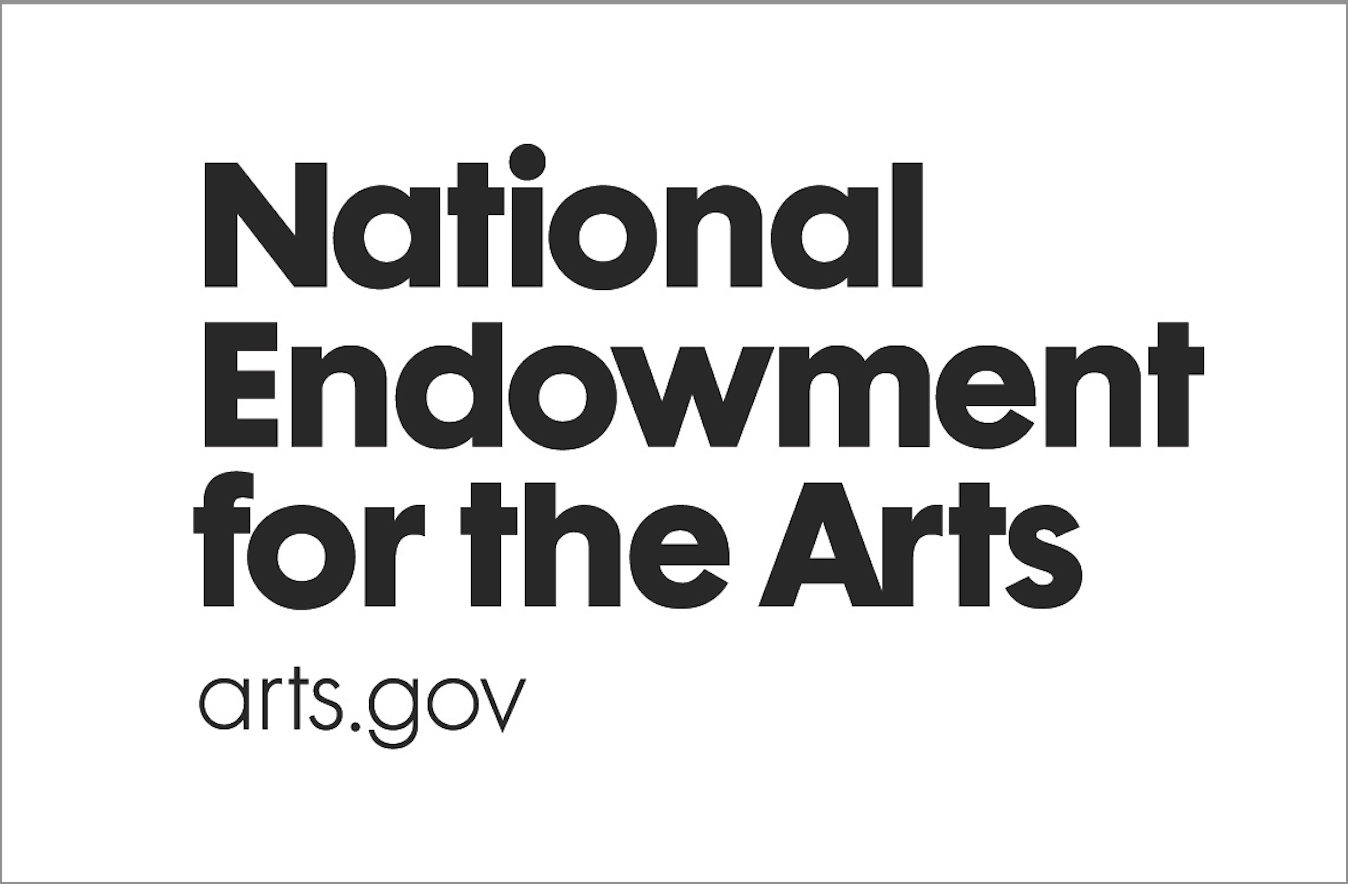Vanity Fair Columnist Richard Lawson, “Mr. Burns” writer Anne Washburn and director Steve Cosson discuss the cartoon that has influenced American humor and political ideology since the late 80s.
Media maven and celebrity gossip hound Richard Lawson gained internet stardom with his witty mastery of the television recap form. Richard — now a Vanity Fair columnist — went to see “Mr. Burns, A Post-Electric Play,” which traces a recap of an episode of “The Simpsons” that takes place seventy-five years following an electric apocalypse. After Richard saw “Mr. Burns,” he chatted with the show’s playwright Anne Washburn and director Steve Cosson. Here is some of their conversation.
STEVE COSSON: This is the first time that I’ve met Richard, but the Civilians office has been obsessed with you for some time.
RICHARD LAWSON: Obsessed? That’s a strong word.
ANNE WASHBURN: It is a strong word.
STEVE: I wouldn’t say obsessed. Our office is not very big, so it was mostly me and our former communications director, who was both a recap and a “Real Housewives” watcher, which is how I first came across you.
RICHARD: It’s funny, when I was working at Gawker, before I was writing for a living, I got an unexpected raise one day. And so I treated myself to a theater ticket, and it was “Gone Missing.” So I went to go see that just on my own, on like a Thursday night and just like, tears, I — I mean I adored that show. So that’s how I came to know about you guys, through that lovely little show on this weird, accidental day.
“Why are we fighting to stay alive? Oh, so we can do plays and just be people.”
I saw “Mr. Burns” on Sunday. It’s so… weird and wonderful and dark and kind of just right. There’s so much apocalyptic, dystopian stuff out there right now that deals more with all that process of like, “Well how do we get water and how do we barricade ourselves and how do we, you know?” All the practical matters. So what’s lost is kind of like, “Well how do they spend their time, and what do they do?” Daily stuff. And what I thought was really cool about the show is that you see the life that people are working to keep, you know? “Why are we fighting to stay alive? Oh, so we can do plays and just be people.” So I thought that was cool. I thought it was a different take. And it’s so cool to see that in theater. I feel like theater is rarely that speculative.
STEVE: Speculative? As in a speculative fiction?
ANNE: I think that question of the science fiction thing — not that this is exactly a science fiction play — but it is speculative in a lot of ways. But a speculative play or a science fiction play, you know, what is that? I think people are getting really interested in that, but there are really interesting differences between what a science fiction book does and what a science fiction movie does and what a science fiction play does. This third, this third thing.
RICHARD: It really puts an interesting spin on it when it’s live and has to be immediate. And I think that’s what allows that kind of specificity of, “The world is ended, in some ways. A lot of people are dead, and people are living very simple, and there’s no electricity.” And we can’t exactly show that on stage. So we have to kind of imagine how they spend their time. A movie of that wouldn’t register in the same way.
ANNE: A movie is about the visual difference. I mean, sci-fi movies can be glorious because it’s just — it’s the visual.
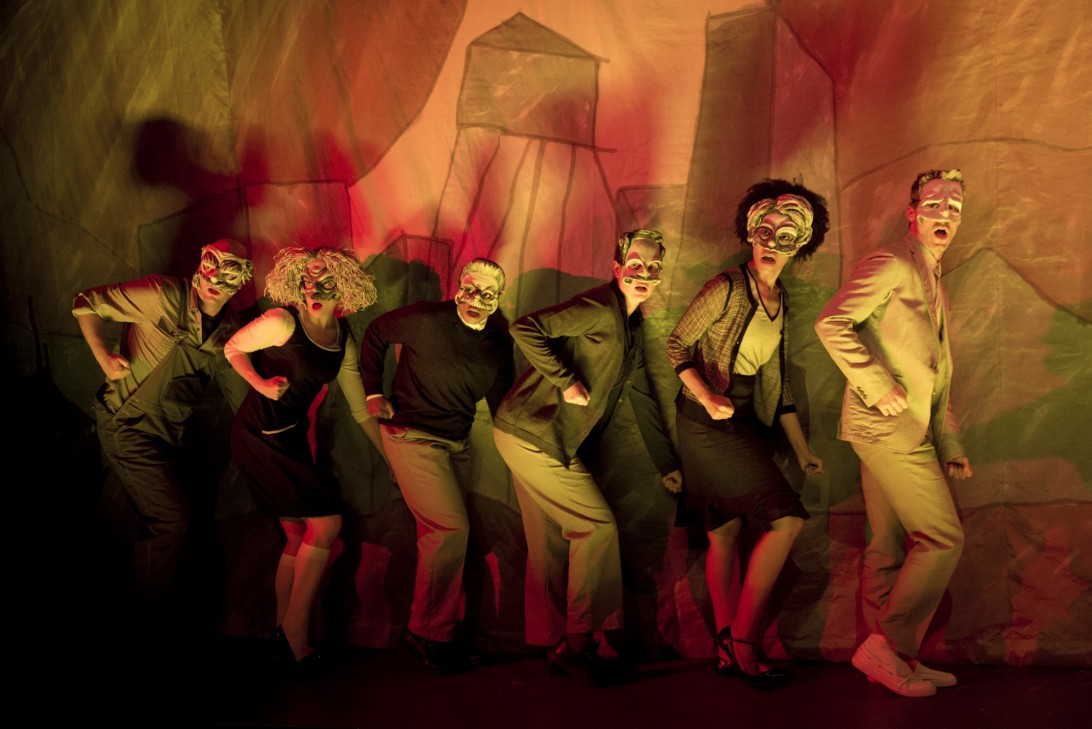
“Mr. Burns, a post-electric play” at Playwrights Horizons. Photo Credit: Joan Marcus.
RICHARD: Did you set out to write a play that was post-apocolyptic or dystopian? Or were you initially interested in something else, and it just became that?
ANNE: I did. I was thinking of post-apocalypse as an interesting operating condition, rather than the grand sweep of what is a post-apocalyptic society. I just wanted to see what would happen if you took a TV show and pushed it past the apocalypse, and then pushed it and pushed it, obviously thinking all the time about what this world is that informs it, and also being curious about the apocalypse and how you function, and what is your day-to-day existence then?
RICHARD: So you were specifically interested in what? Television? How that would sort of survive in the kind of cultural conversation? Did you have the idea that it was gonna be a TV show that you wanted to look at?
ANNE: Well, I wanted it to be a story. I really wanted to see how a story would change. And then if you’re thinking, “What’s a story that everyone knows? What are the popular stories?” You know: television. Those are the stories that everyone is conversant with.
RICHARD: It was odd seeing the play in some ways, because I really grew up on “The Simpsons.” I’d say seasons one through ten were my bench mark for television and are the basis of my sense of humor and, in a lot of ways, my political ideology. “The Simpsons” is thoroughly in my system. But to see people on stage in a theater talking about “The Simpsons” and re-capping the episodes out loud the way that I have done my whole life was sort of strange. I was like, “Oh, other people do that.” You know? And then to have that grafted onto this idea that this is upwards of a hundred years from now was unnerving in maybe the best way, you know? Like, “Oh, of course. This thing that I sort of take for granted is, in fact, it’s own cultural document that will exist in the past for me.” It was a little scary to think about, but it was good. It was comforting in a strange way. I mean, the thing with the rakes was great. It was like, “Yes!” Because that is the moment from that episode that everyone’s gonna remember.
ANNE: For the most part if you just pay attention to the story and how it’s told and the discussion of it, you don’t need to have seen “The Simpsons.” The rake joke is really the one moment where, if you haven’t seen the episode, you don’t know what that is.
RICHARD: It’s the little nod.
ANNE: What is that term for the little gifty in the video game?
RICHARD: The Easter Egg.
STEVE: The Easter Egg rake!
RICHARD: So how did you arrive at that episode? Were you a Simpsons person and you just sort of went through your little encyclopedic mind of—
ANNE: I’m a “Simpsons” fan in the same way that I, you know, I watched it sort of haphazardly in re-runs fairly continuously for some number of years. But I don’t have that kind of brain that retains things in that way or catalogues them. I just don’t function that way. So to come up with that episode, I knew that I wanted to get a group of actors together, and I knew that I wanted to try to get them to remember an episode. So we got together this group of Civilians’ actors in 2008. The free rehearsal space that summer, which was being passed around by Clubbed Thumb, was a bank vault. A dis-used bank vault. A discontinued bank vault deep underneath Wall Street. Some massive building, I don’t remember where.
STEVE: A weird room near a bank vault. We weren’t actually in a metal box.
ANNE: We were!
STEVE: We went into the actual vault once. We did a little improv there.
ANNE: Yeah, I’m telling this story to where we were actually in the vault.
STEVE: Okay, that’s fine, that’s fine.
ANNE: We were often in the vault. We were certainly right next to it.
STEVE: We had a bunch of rooms. It was actually on Wall Street.
RICHARD: What a weird year to be doing that.
STEVE: Right after the collapse, after the collapse of the economy.
ANNE: It was before the collapse, it was before the collapse. It was the Summer.
STEVE: Really?
ANNE: Yeah, Summer of 2008.
STEVE: See I have a terrible memory for facts, time, space, direction, basically a terrible memory for everything. Didn’t the economy collapse in 2007? It was 2008?
ANNE: 2008 in the Fall. Right around the election.
STEVE: Oh, right. But I do remember it was actually on Wall Street. And you went in and went through security and went down, like, seven flights.
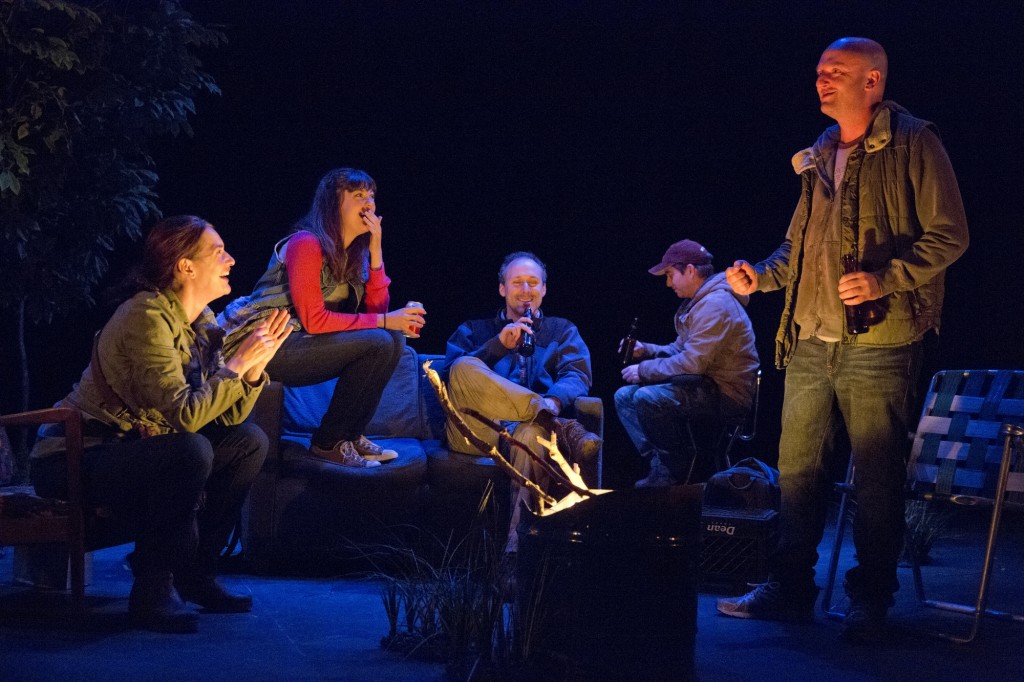
“Mr. Burns, a post-electric play” at Playwrights Horizons. Photo Credit: Joan Marcus.
ANNE: Yeah, there was no cell service. There were horrifying little fluorescent lights. So it was a great environment. And we sat them down and just asked them to remember Simpson’s episodes as best they could, Matt Maher, who’s a bit of a savant with the Simpsons. And Jennifer Morris and Maria Dizzia were helpful, too. They pretty swiftly narrowed it down to that as being the most promising episode. So it really was chance.
RICHARD: Was it because they remembered it best or because it seemed like it could have had the most dynamic stuff?
ANNE: Because they remembered it the best. If they had not been able to remember anything, our plan B was we would put a bunch of episodes which seemed fruitful, make them watch them three or four times over the course of a week, and then go away for six months, and then come back and remember it. Also, if while I was trying to write the play, if that episode was really not yielding, we would have picked something else. But as it turns out, I cannot imagine a more perfect episode. It is the most popular one and it is the one that most people remember. Interestingly enough, John Viddy, the guy who wrote the episode, came and talked about it at a panel at Playwrights, and he said that this was the last episode that that bunch of guys did before they left. It’s that crew that’s responsible for seasons one through five.
RICHARD: Its heyday, basically.
ANNE: The heyday guys. It was the last episode they were gonna do. It wasn’t a “fuck you,” but they were tired. And the rule of “The Simpsons” was that you can’t spend an episode on one story. You’re always shifting the story around, so that if somebody doesn’t know “Cape Fear,” then there’s some other cultural reference they can coast along on coming up soon afterward. But they just said, “Fuck it,” and did the episode about the one story basically, which I think is part of what makes it the episode everyone remembers. You can really track the story all the way through. It is a single story, with a single arc.
RICHARD: I have a friend of mine from college, lives in Davis, California, and I will go and visit him and his girlfriend for, like, a weekend or something every year or so. And he has seasons one through twelve of “The Simpsons” on DVD. And so they go to work, if it’s during the week, and I’m just, you know, a pig-in-shit. I’m just like, “Oh, which one am I gonna watch?” And it’s funny, because a lot of the times, I remember the A story, but I think that the B story is a different one. It’s almost like you can interchange those things. But the Sideshow Bob “Cape Fear” episode is just that episode. There’s no confusion about what Lisa’s doing or, you know, if Moe has a subplot or something. It’s all very specific. I feel like I remember watching it when it aired and being surprised that it went so far out of its own world, you know? When it goes (a la “The Simpsons” theme) “The Thomsons” half-way through the episode, it was jarring, like a reset button or something. It was cool. And I think that kind of remaking, or re-imagining, really lends itself to this show, because it’s so much about that.
STEVE: Well, and you think in that moment they’re remaking the frame of “The Simpsons” when they change the Simpsons. When the Simpsons go into witness protection and become the Thompsons, they are remaking “The Simpsons” parody of the remake of the movie, which is a remake.
ANNE: Which is adapted from a novel.
STEVE: Which is adapted from a novel. Which I think is also part of the choosing of the “Cape Feare” episode. Because I feel like Matt remembered “Lisa the Vegetarian” just as well. That’s one that has lots of really good lines.
ANNE: “You can’t make friends with salad.”
STEVE: “You can’t make friends with salad.”
RICHARD: “Sure Lisa, some magic animal.”
STEVE: “Sure Lisa, some magic animal.” “It’s tomato soup served ice cold.” We spent some time on that on the first day of the four day workshop. And on the first day, some actors would come in who maybe didn’t know the episode, who would then hear it from Matt and Jenny or whoever else was there who remembered it. And then the next day they would recreate parts of it for other people. So it was an oral tradition of remembering and recalling and passing it along.
ANNE: I guess it may have been a totally smart, focused, artful decision, and I just may not remember that way. I remember it as though somehow, giddily, we just ended up with that. It’s intrinsically juicy. It has everything to do with…
STEVE: Disaster. And it’s scary. In a weird way, their version of “Cape Fear” is scarier than the original. The whole thing about Bart, the small child. Someone is trying to kill him, and he takes it seriously. His parents don’t care.
RICHARD: Yeah, this adult is trying to kill a child. That’s really dark stuff, but it’s offset by all that sort of — if my father wasn’t sold on that show prior to that moment, he was like, “Oh, well this is smart stuff.” So it has that great mix. Was there anyone who just didn’t know the show at all? Or had you selected people who had some former knowledge.
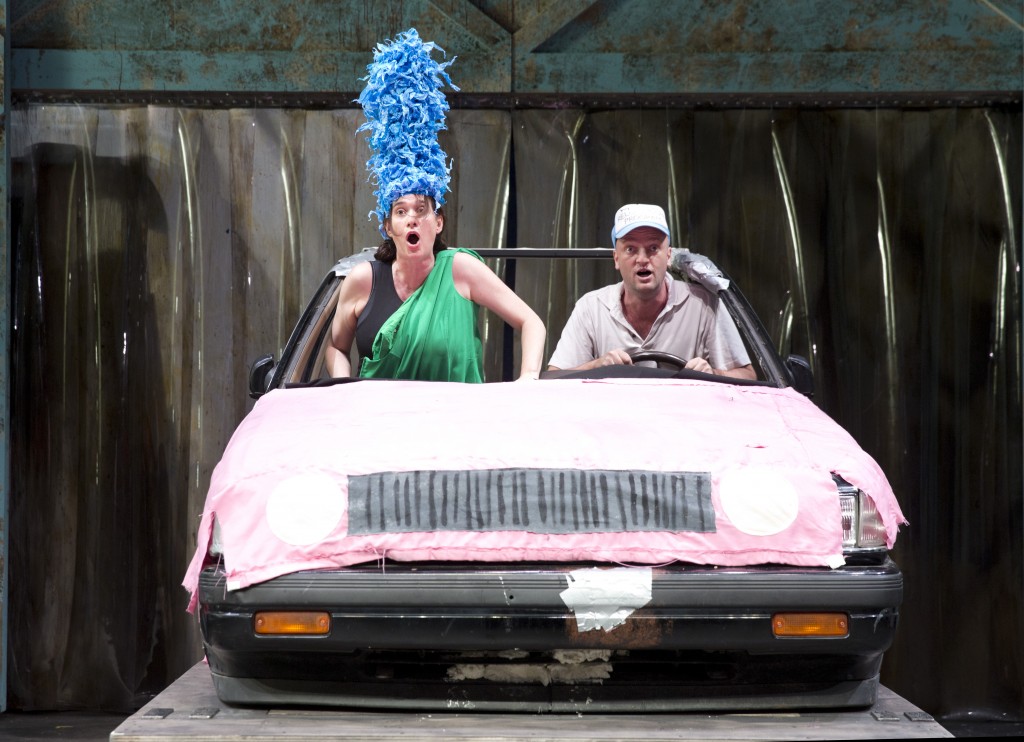
“Mr. Burns, a post-electric play” at Playwrights Horizons. Photo Credit: Joan Marcus.
ANNE: They had all seen it, certainly. But some of them could not remember word one. Only a tiny image from that episode.
STEVE: We had Sam in the workshop, and I think he’d never really watched “The Simpsons.”
ANNE: Oh, because he’s Canadian, yeah.
STEVE: I think just because he’s Sam. I’m sure they have “The Simpsons” in Canada. They have “The Simpsons” in Mexico and all the way in South America.
RICHARD: I mean, that’s the other thing I was thinking about. I loved all the region-specific stuff. I’m from Boston, so hearing Framingham in the play, I was like, “Whoa this is so specific to my life.” I feel like “The Simpsons,” beyond any other show in the last thirty, forty years, is something that anyone across the world who has a television has probably seen some part of, right? Like an episode, or a snippet or something. So I was thinking, as I was watching it and afterward, “Alright so if they’re doing these plays, you know, or pageants — whatever you want to refer to them as — is that happening elsewhere with the same show? Has “The Simpsons” become the currency, or are there, like, “Friends” ones?
ANNE: I think there’s everything. They talk about “ER.” About an “ER” show.
RICHARD: Oh, yeah, that’s right.
ANNE: I love to imagine an “ER.” It’d be all about, somebody finds the gurney. It’s the prop that gets used in every episode. Someone brings the gurney, and they put up the white sheet, and then they’re flicking blood from behind the white sheet. Some guts are splattering around. And that becomes, like, this whole fantasy of medical intervention, which of course they wouldn’t have in the future. I think it would be a bunch of different things. And I think “The Simpsons” might be more popular, because, I mean, this whole thing you talk about, that you would riff with your friends. We just did a little line-riff ourselves. People do that with “The Simpsons.” They don’t do that with ER. They don’t so much do that with “Friends.” That specificity of the humor is part of the pleasure of “The Simpsons,” but it’s also how people respond to it. They’re always remembering it in that way. So maybe “Simpsons” would have the most accuracy, but I think there would be tons of things. There’s a joke in there, which there isn’t room to put in, because there’s no way for a person to say it without being horribly unwieldy. But in that scene where Quincy is yelling at Suzanna and telling her, “Go to the ER!,” what you want her to also say is, “Go to one of the Shakespeares. They are always looking for people.” And you come to understand that to be part of the Shakespeares is to be really a prostitute — half prostitute, half theater maker.
STEVE: Like the valet in Paris in the nineteenth century.
ANNE: Yeah, no, yes. Completely. Completely.
RICHARD: I don’t know if you guys ever read Buzzfeed, but there’s a whole section on that website called Rewind. And it’s all just nostalgia stuff. Mostly 90s stuff. It’s just this kind of currency of like: “Remember this?” And I think prior to that kind of stuff existing on the internet, “The Simpsons” was that sort of catch-all. I think that’s why it was so quotable, because it’s self-referencing other things all the time. Constantly. Every second, I feel like. I mean, I’m sure that in your apocalyptic world, someone’s doing a “Frasier.” You know? But probably a lot fewer people, because that was specific to itself, whereas “The Simpsons” was addressing a much bigger range of topics.
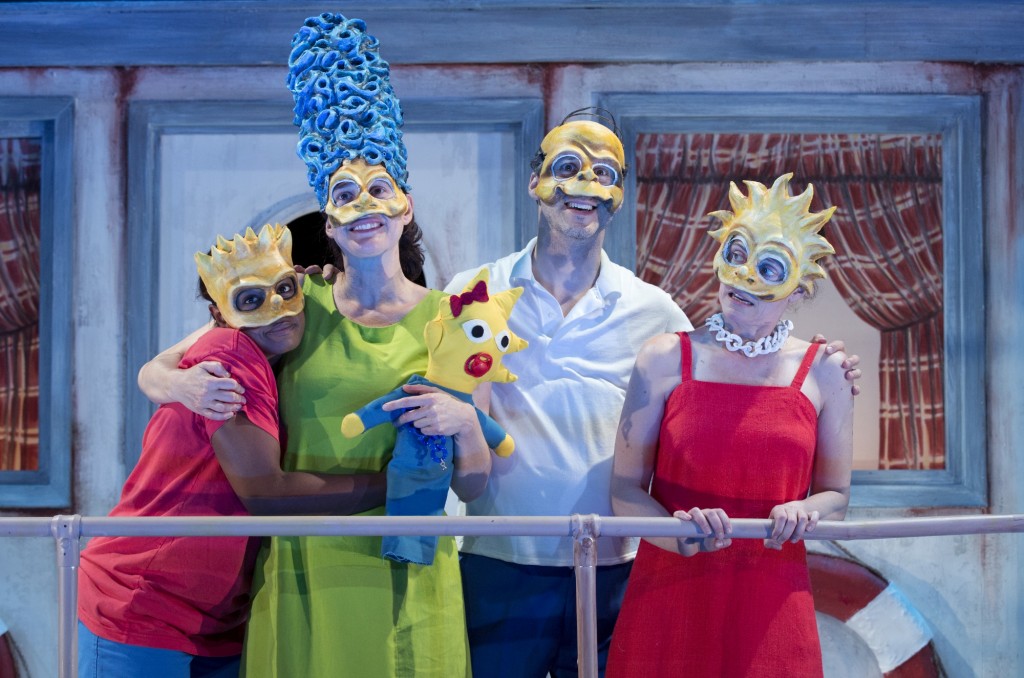
“Mr. Burns, a post-electric play” at Playwrights Horizons. Photo Credit: Joan Marcus
ANNE: You can talk about family with “The Simpsons,” you can talk about community. You can talk about — you have tons of characters. “Frasier,” if you don’t have the continual wit of it, it just becomes a story about two curiously uptight men who live in a world which people have no reference to, but also isn’t the kind of world that people would fantasize about. We’d have fantasies of great eating or security, but you wouldn’t quite have fantasies about going to the opera, or—
RICHARD: Right, exactly. Or having a view of the Space Needle, you know? With “The Simpsons,” it’s so changeable. You guys reference the Minister Thomson thing. Homer is that dumb sometimes, but other times he’s not, you know? And it’s okay within that world, because it’s just different episode to episode, even sometimes scene-to-scene. Whereas Chandler always has to be Chandler on “Friends.” You can’t wriggle on that.
STEVE: Well, there’s certainly something in going into the third act of the show, where it leaps into the future, and what you’ve been watching the first part and the second part really turns into fully, fully evolved theater of the post-electric future. For me it makes a lot of sense that it’s something like “The Simpsons” that makes that full leap. That in the second part, where, yeah, there’s probably all sorts of old TV shows that might exist on an only-seven-years-after-The-Apocalypse entertainment circuit. And probably Shakespeare exists seventy-five years after that, too. But I think there might not be a “Friends” of the seventy-five years after. Certainly as the director, it makes a lot of sense to me visually that you would take the cartoon characters of a world in which there was television and then that translates into these archetypal characters, these iconic characters. It makes perfect sense that they would turn into masks, something that we don’t quite have in our theater, because our theater in many ways has lost its theatricality. We have probably the most naturalistic theater in the history of theater. Most like what we imagine real life to be like. And one of the things that is wonderful about the non-naturalistic theater is you can have the character of Bart Simpson. If Bart is a mask — Bart is a character and behaves a certain way and does certain things and has a certain emotional life and sound and physicality, and a mask, which is pretty much always the same — the character is kind of immortal. The character exists in a real way, independent of whatever actor is playing him. The actor steps into that role. Bart and all those characters are real in the theatrical landscape. One of the things we’ve heard from audiences and from critics about this show is that it — when it turns into theater — that there’s something ancient about it, or there’s something elemental.
Post Views:
1,032





